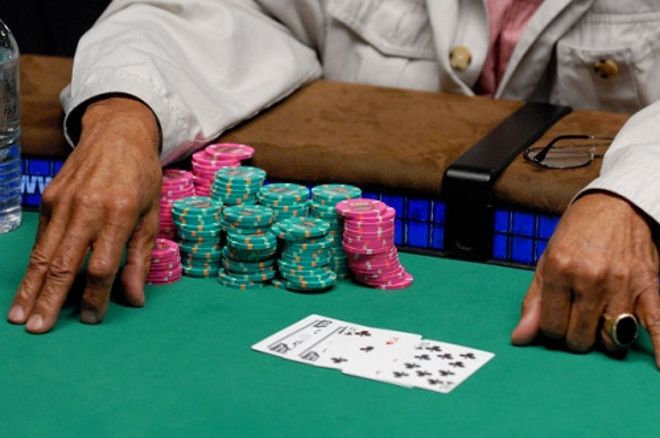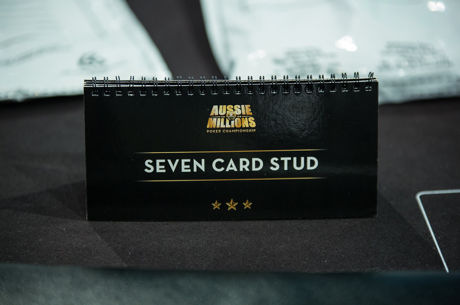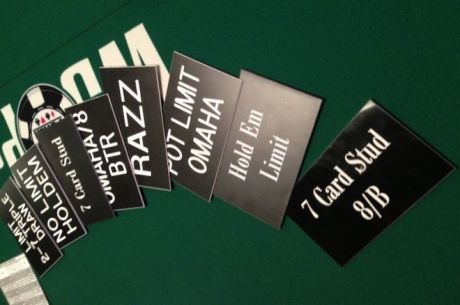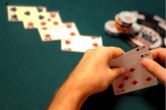Eight Tips for Seven-Card Stud Hi-Low Eight-or-Better

When I was starting out in 1992, seven-card stud eight-or-better �� a.k.a. stud hi-low �� was being touted as the game of the future, and it was spread in many poker rooms. No longer. It��s still spread occasionally in some of the bigger card rooms like the Commerce and the Bike, but it��s relatively rare, usually only turning up as the ��E�� in mixed games like H.O.R.S.E. or H.O.S.E.
With the 2016 World Series of Poker upon us, however, interest in all sorts of non-hold'em games including eight-or-better tends to pick once more. Here are eight poker tips that will help you gain an edge in seven-card stud hi-low.
1. Play two-way hands
Some poker books claim that eight-or-better is really like playing two games at once �� high and low. Some recommend that you can play starting hands that might win either high or low. That��s awful advice. Go for two-way hands. You want to play to scoop the pot, not win just half. Excellent starting cards that can help you scoop hands include three low cards that are suited, three low cards including an ace, and three low straight cards like 3x4x5x, 4x5x6x, and 5x6x7x.
2. Don't chase with only a high hand
In stud high-only, you��ll often find yourself chasing with a lower pair-higher kicker hand or with a flush or straight draw. Don��t do this in eight-or-better. If you believe you��re the second-best pair on third street, fold. Don��t draw to high flushes or high straights. There are exceptions, of course (e.g., if the door cards indicate no one is going for low).
3. Respect a raising ace
Don��t guess that the player with an ace showing is going for the low when you have kings �� and call. Similarly, even your smoothest 6- or 7-low may be behind. Unless you have experience with the raiser and know that he��s likely to misrepresent his hand, or you have a monster yourself, fold in these spots and look for a better hand down the road.
4. Avoid heads-up play when you have only a low
Even your best low hands don��t fare well against a premium pair. They also become increasingly tough to play, even if you catch good. For example, even starting with 3x4x5x against a pair of kings, you��re a dog, winning only 40% of the time. Then even if you catch good �� with an 8x, for example �� you��re still only about even money on the pot. The exception is if you have an ace as part of your low hand, which really turns your hand into a possible high hand as well.
5. Raise with your exposed ace, even if you��re going for low
With a pair of aces, of course you��d raise. But don��t be timid with your exposed ace and two other babes �� raise then as well. Scare away the high hands that might be ahead of you, hoping to go up against one or two lows instead. You may scoop by hitting another ace, or even take the high with just one naked ace in the end while winning the low. You also may win half the pot even if your low is beaten.
6. Know where your money will come from if you don��t scoop, and consider your raises accordingly
There will be situations in eight-or-better when there are three of you in the pot. Two of you may each have half the pot locked up by fifth or sixth street, but you��ll have only a one-way hand. Unlike the high-only variation of stud, you might well be better off keeping in the third player rather than raising that player out, since you��ll be dividing up his money on the river.
7. Freerolling is golden
You want to raise mercilessly when you have half the pot locked up and may scoop if you hit, or if your opponent misses. If, for example, you��ve made your low on fifth street, raise your lone opponent if he makes the mistake of betting with only a possible high hand, even if you know he has a monster. Why not? Two perfect cards for you might beat him.
8. If you��re drawing, or unsure where you stand, it often makes sense to fold to aggression on sixth street and the river
High-only players are often in the habit of calling on both sixth street and the river once they have called fifth street, realizing that the size of the pot they might win is huge compared to the size of the bets they must call to see if they can make their draws or to keep their opponents honest. This is often a terrible decision in eight-or-better. With three or more players in, players in the lead often raise and reraise, making it extremely expensive for the odd man out. It��s often not just one more bet to see the next street, but four more bets. Similarly, with a likely split pot, the money you��ll win if you hit is half of what it would be in a high-only game.
This article is meant to give you a few pointers for stud hi-low, not a complete strategy. For that, I recommend two books �� Super System 2 (specifically the chapter by Todd Brunson), and Ray Zee��s book on the game, High-Low Split Poker for Advanced Players.
Ashley Adams has been playing poker for 50 years and writing about it since 2000. He is the author of hundreds of articles and two books, Winning 7-Card Stud (Kensington 2003) and Winning No-Limit Hold��em (Lighthouse 2012). He is also the host of poker radio show House of Cards. See www.houseofcardsradio.com for broadcast times, stations, and podcasts.
Want to stay atop all the latest in the poker world? If so, make sure to get PokerNews updates on your social media outlets. Follow us on Twitter and find us on both Facebook and Google+!









